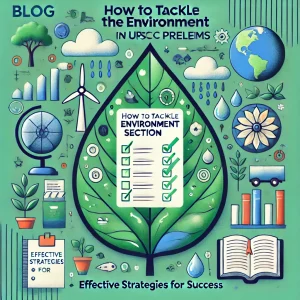The Importance of Environment and Ecology in State PCS Exams
Environment and Ecology have gained significant importance in recent years, particularly in the context of competitive exams like State PCS. With the growing awareness of environmental issues and the pressing need for sustainable development, topics related to environment and ecology in State PCS exams have become crucial. This blog will explore why these subjects are so important and how to effectively prepare for them.
Why Environment and Ecology Matter in State PCS Exams
The increasing frequency of natural disasters, climate change, and the depletion of natural resources have brought environment and ecology into the spotlight. Governments worldwide are implementing policies focused on environmental conservation and sustainable development. This global trend is reflected in competitive exams, where questions on environment and ecology in State PCS exams have become more prominent.
Understanding environment and ecology is essential for aspiring civil servants, as they will be responsible for implementing policies that impact the environment. Knowledge in these areas equips candidates with the understanding needed to address local environmental issues, promote sustainable practices, and contribute to national and global efforts for environmental conservation.
Key Topics to Focus on for Environment and Ecology in State PCS
When preparing for environment and ecology in State PCS exams, candidates should focus on several key areas:
- Basic Concepts of Ecology: Understanding the fundamental principles of ecology, including ecosystems, biodiversity, food chains, and biogeochemical cycles, is essential. These concepts form the foundation for more complex topics.
- Environmental Issues: Topics such as air and water pollution, deforestation, desertification, and global warming are often covered in exams. Candidates should be aware of both the causes and effects of these issues, as well as the measures being taken to combat them.
- Conservation Efforts: Knowledge of national parks, wildlife sanctuaries, and biosphere reserves in India is crucial. Understanding the importance of conservation efforts, endangered species, and the role of international agreements like the Kyoto Protocol and Paris Agreement is also vital.
- Environmental Legislation and Policies: Familiarity with key environmental laws in India, such as the Wildlife Protection Act, the Forest Conservation Act, and the National Green Tribunal, is necessary. Candidates should also be aware of recent government initiatives aimed at promoting sustainability.
- Current Affairs: Keeping up-to-date with recent developments related to environment and ecology is crucial. Questions in State PCS exams often reflect the latest environmental news and issues.
How to Prepare for Environment and Ecology in State PCS
Preparation for environment and ecology in State PCS exams requires a multi-faceted approach. Here are some effective strategies:
- NCERT Books: Start with the basics. NCERT textbooks for Geography, Biology, and Environmental Science from classes 6 to 12 provide a solid foundation. These books are concise and cover the essential concepts required for understanding environment and ecology in State PCS exams.
- Reference Books: For a more in-depth understanding, refer to books like “Environment” by Shankar IAS Academy or “Ecology and Environment” by P.D. Sharma. These books provide detailed explanations of various topics and are widely recommended by experts.
- Online Resources: Sleepy Classes (sleepyclasses.com) offers comprehensive courses that cover environment and ecology in State PCS exams. Their study materials, video lectures, and quizzes are tailored to meet the needs of aspirants, especially those with limited time.
- Current Affairs: Subscribe to magazines like Down to Earth and Yojana for the latest updates on environmental issues. Websites like the Ministry of Environment, Forest and Climate Change also provide valuable information.
- Mock Tests and Previous Year Papers: Practice is key to success. Regularly attempt mock tests and solve previous years’ question papers. This will help you understand the exam pattern and the types of questions asked on environment and ecology in State PCS exams.
- Stay Updated: Follow news portals and environmental blogs to stay informed about current environmental issues. This will not only help in answering questions but also in writing essays and presenting arguments in a structured manner.


